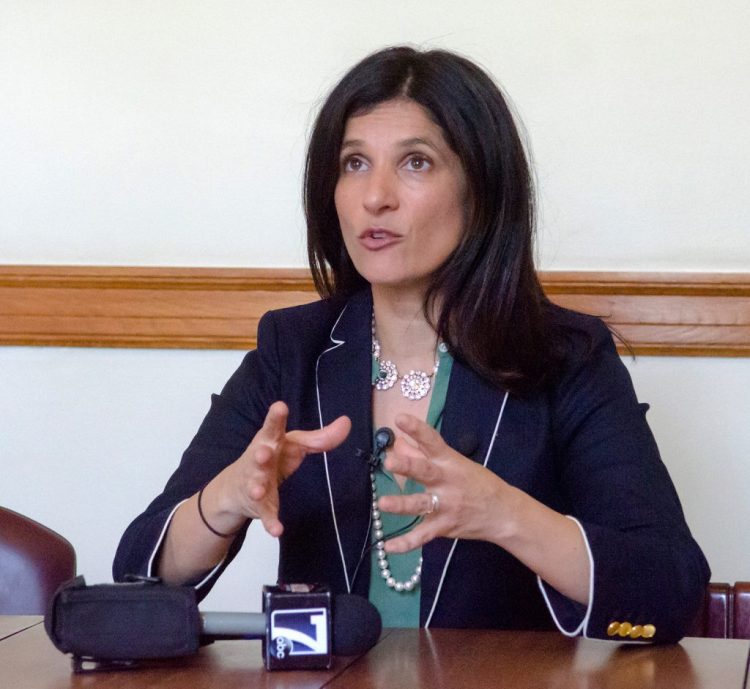Democratic House Speaker Sara Gideon is proposing a bill to provide Maine workers with up to 12 weeks of paid medical leave for childbirth that would be funded by a 0.5 percent tax on worker earnings.
If passed, Maine would join a handful of states that offer paid family and medical leave to workers, allowing new parents and those suffering from a major illness or caring for a sick relative to collect part of their wages for three months or longer.
The bill would expand on a federal law that requires most employers to give employees unpaid family or medical leave of up to 12 weeks.
Changing the benefit from unpaid to paid will make it more realistic for families to use the benefit, Gideon said. One in four mothers goes back to work within two weeks after childbirth to avoid losing pay, according to U.S. Department of Labor statistics.
“We think this is one of the most important policy proposals, not just to help Maine families, but to help us as a state achieve one of our most important goals, attracting a strong, vibrant workforce,” Gideon said in an interview Tuesday. She said paid family leave could give Maine a competitive advantage over states that don’t have the same benefit and help with Maine’s workforce shortage by encouraging more young families to move to Maine.
Most other industrialized countries have paid leave benefits. In Canada, for instance, parents are offered standard parental benefits for up to 35 weeks, at 55 percent of average weekly earnings.
While the details of the proposal could be subject to compromise, the initial bill would give all full-time, self-employed and part-time workers in the state a paid benefit of up to 12 weeks for the birth of a child, or up to 20 weeks for a serious medical condition. The leave would be funded by an 0.5 percent tax on employee wages.
The money generated would go into a statewide insurance pool, and would pay workers, depending on their income, 67 percent to 90 percent of their pay, capped at $800 per week. The lowest-income workers would receive 90 percent of pay, but everyone, regardless of income, would get up to $800 per week to offset lost wages.
If approved, Maine would join California, New Jersey, Rhode Island, New York, Washington, Washington, D.C., and Massachusetts, which either have existing paid family leave benefits or approved laws that have yet to be implemented.
The earliest the program would go into effect in Maine would be 2020, Maine Democrats said.
John Bott, spokesman for minority House Republicans, said in an email response to questions that the proposal will be “carefully” reviewed once the details are released.
“Republican pro-growth policies and fiscal restraint have created a record-high number of employers, record number of private-sector jobs, higher wages, record unemployment and a healthy budget surplus. We want the Maine economy to keep growing to benefit even more residents and their families. We will review all proposals with that in mind,” Bott said.
Democrats control the House, Senate and governor’s office.
Gov. Janet Mills and state Democratic lawmakers are pushing a much more progressive agenda after eight years of conservative Republican Gov. Paul LePage. Mills implemented Medicaid expansion on her first full day in office on Jan. 3.
Scott Ogden, Mills’ spokesman, said the governor will work with Gideon and others on the bill.
“Governor Mills applauds Speaker Gideon’s leadership on this issue and shares her goal of working to ensure that people across Maine are able to take appropriate leave following major life events, like the birth of a child. The governor looks forward to reviewing the Speaker’s bill and working with her, other lawmakers, and members of the business community to pursue avenues to accomplish it.”
Quincy Hentzel, president and CEO of the Portland Regional Chamber of Commerce, said the organization hasn’t seen the details of the bill yet.
“I can state this is undoubtedly a complicated issue, and the business community should be involved in the discussions as this progresses through the process, in part to avoid the potential for unintended consequences,” Hentzel said.
Gideon said some companies, such as Wex Inc. and L.L. Bean already offer paid family leave, but it should be available to all working Mainers.
“We shouldn’t think of family leave as an elite benefit, only available at some companies. Everyone in Maine, whether they have a child or are caring for a sick family member, should have access to this same benefit,” Gideon said. “It should be like unemployment insurance, there for you when you need it.”
Thirteen percent of private sector employees had access to a paid family leave benefit in 2016, according to the latest statistics from the U.S. Department of Labor.
Eliza Townsend, executive director of the Maine Women’s Lobby, said they are “enthusiastic supporters” of the proposal.
“This would be an enormous benefit,” Townsend said.
Townsend said the Maine Women’s Lobby, despite having only five employees, currently offers paid family leave as an employer-funded benefit. But Townsend said if workers instead paid into a statewide fund, that would remove the financial burden from employers. That would free up money for companies to pay for temporary replacement workers or to pay overtime to employees when a worker uses the paid family leave benefit.
Some states, such as Massachusetts and Washington, split the cost among employers and employees, while other states have an employee-funded pool.
Joe Lawlor can be contacted at 791-6376 or at:
jlawlor@pressherald.com
Twitter: joelawlorph
Send questions/comments to the editors.




Comments are no longer available on this story